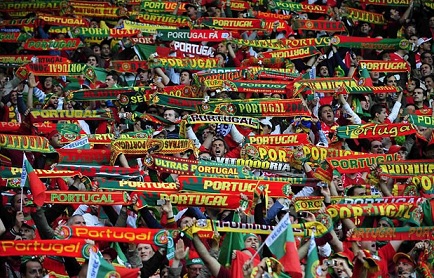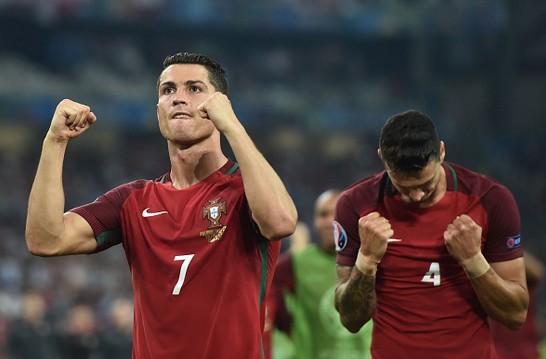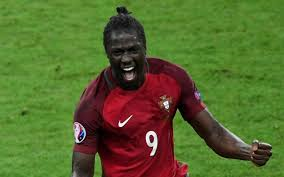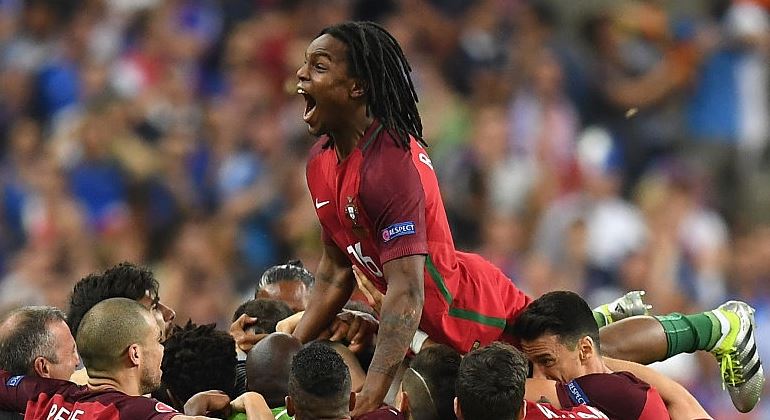Honoring the past: celebrating the heroism of the present: embracing hope for the future 
14 June, 2016. I woke up sooner than I had wanted. I was damn tired from all the travel and my every movement invoked protest from my weary body. I climbed down the small ladder leading from my bunk and stumbled out the front door into the cool of the morning. My, that view. The fresh air, and the absolute quiet. It was beautiful.
From that small lodge in Farnay, Tom Kundert and I first began our coverage of Portugal’s Euro 2016 crusade in France. Pictures cannot do it justice. Neither will my description, no matter the imaginative verbiage I might employ. But I hope that place will forever rest in my memory just like I hope the incredible events of that time will not be forgotten.
I did not know it then, but Portugal were about to do something remarkable, and I was one of the privileged few to witness history being made. 2016, the year of the Seleção.
What a year it was. The culmination of a long and bitter struggle for silverware that had remained unattainable despite our best efforts. A year of vindication. The hurt over Euro 2004 in particular had begged for a redemption that the Golden Generation could not deliver at the 2006 World Cup, nor could Ronaldo it seemed when Portugal fell short at Euro 2012. This year was a truly unique and special time to be a supporter of Portuguese football.
But was Euro 2016 merely the end of an incredible journey? The events of July 10th certainly brought a deep sense of fulfillment, but is that the same thing as closure? The longer I reflect, the more I am convinced that it actually represented the beginning of a new era. It really wasn’t a destination so much as a bridge to an entirely different future for this national team. A future in which Portugal are no longer the bridesmaid waiting forever to be the bride. A future of incredible promise as raw talent comes of age. But more frighteningly, a future that someday will not include Cristiano Ronaldo.
I bring up that potentially dismaying subject not because I think Ronaldo is any less important for us now than he was 5 or 6 years ago. Nor do I bring it up because of his recent struggles at Real Madrid. I bring it up because it was this year, and in particular at the Euro 2016 final, that we saw firsthand what a future without him might look like. It reminded me that this future is coming, and maybe, just maybe, it will not mean a return to anonymity for the Seleção.
Paradoxically, it was the first time in over 10 years that any of us saw a Portugal squad come together and prevail in desperate circumstances without Cristiano Ronaldo. I am, of course, deliberately excluding scenarios like the WCQ playoff in 2009 against Bosnia that was won without Ronaldo due to injury.
 Please do not misunderstand me, this is not a piece about why we should move on from the “Ronaldo era.” Without him we surely do not escape the group stage of Euro 2016. But none of us really knew with absolute certainty how this team would perform in a high-profile contest like that without Cristiano until that historic day in St. Denis. Moreover, you might say 2016 was Ronaldo’s best ever after his UCL triumph with Real Madrid and Silver Boot performance at the Euros. His fourth Ballon d’Or seems inevitable. Will it be his last?
Please do not misunderstand me, this is not a piece about why we should move on from the “Ronaldo era.” Without him we surely do not escape the group stage of Euro 2016. But none of us really knew with absolute certainty how this team would perform in a high-profile contest like that without Cristiano until that historic day in St. Denis. Moreover, you might say 2016 was Ronaldo’s best ever after his UCL triumph with Real Madrid and Silver Boot performance at the Euros. His fourth Ballon d’Or seems inevitable. Will it be his last?
This year, which started so poorly if you’ll remember (against Bulgaria on 25 March), ended in such a way as to convince me that our destiny still awaits us. But what exactly is that destiny? True, there’s still the small matter of World Cup qualification to sort out, but there exists a palpable conviction that this group of players might be capable of something much, much greater. That Euro 2016 was merely a stepping stone along the path towards some unimaginable place in the history of football.
What if…..
Back in Farnay, Tom and I were as frustrated as anyone by the result against Iceland on June 14th. The next day we went for a jog around that small village and tried to unwravel the mystery concerning Portugal’s failure to take the next step in major tournaments.
As always, it was Tom who provided the cultural insight necessary to understand Portugal’s failings over the years.
“If you were to compare Portugal to Germany,” he said, “there’s a crucial distinction to be made regarding tactics and player development. Germans are purposeful, and committed to their individual roles that ultimately serve the collective. Midfielders are industrious, and don’t bother about trying to beat their opponents for skill just for the sake of winning the individual duel. Wingers send in crosses, strikers put the ball in the back of the net. It’s effective because no effort is squandered on individual trickery. In Portugal, for example, a winger might beat his marker, stop, let the defender recover, and try to beat him again even though he might have had the opportunity to shoot or make a crucial pass. This is how so many young Portuguese players learn the game.”
Compare the Ronaldo of 2004 to Ronaldo now. Compare Santos’ interpretation of Portugal to that under Luiz Felipe Scolari. 2016 was the most successful year ever because Portugal finally played with resolve. It was functional, full of purpose. Roles were defined and players were chosen specifically for those roles instead of just throwing the most talented XI on the pitch at once. “We will be very difficult to beat,” Santos told us. Indeed they were, and wasn’t it grand?
But even I have to admit that I did not think this team was capable of what it achieved in 2016. The football they played this year drew upon the pragmatism of a manager who spent a large portion of his career in Greece, that nation so often associated with obstinate defence. But it was a style channeled through the bodies of dynamic, attacking footballers like Raphael Guerreiro, Renato Sanches, João Mário, and of course, Ronaldo.
The results were spectacularly inconsistent:
The 7-0 demolition of Estonia and the 0-0 stalemate against Austria…the tactical gridlock of the Round of 16 match against Croatia juxtaposed with the reckless abandon of the group stage encounter with Hungary…the 2-1 victory over Belgium and the tame 0-1 defeat against England in the run-up to the Euros…even the finale against Latvia in which Portugal endured a lacklustre first half and a potentially devastating second half equalizer only to secure a rather predictable 4-1 result.
It wasn’t always pretty and it wasn’t always potent, but you get the feeling that Portugal’s metamorphosis is only just beginning. Benfica and FC Porto have finally joined Sporting in cultivating world class Portuguese talent. Gelson, Andre Silva, and João Cancelo all made brilliant starts to their Seleção careers. Not far behind them are Diogo Jota, Bruma, Ruben Semedo, Gonçalo Guedes, Andre Horta, Ruben Neves, and other brilliant talents just now breaking into the starting XI of their respective club sides.
The gap in quality between “Portugal with Ronaldo” and “Portugal without Ronaldo” is shrinking as the team’s cohesion and technical IQ increases. Some say that Ronaldo cannot carry this team anymore, but the truth is he doesn’t need to anymore. There are still some positional concerns ahead (centreback duo after Pepe and Fonte retire?), but 2016 was a year in which we saw glimpses of a very bright future even as we reveled in the moment.
It was a year of compelling individual storylines. Eder’s exquisite goal overlaid on a historical tapestry of personal struggle. Ricardo Quaresma’s tournament-saving goal in the 117th minute against Croatia after a career spent desperately trying to discover how to translate his outrageous skill into vital contribution for the Seleção. Renato Sanches’ meteoric rise, Nani’s revival, Ronaldo’s record breaking feats, and the success of Fernando Santos’ unflappable leadership. Portugal doing the unthinkable and winning a major championship in the face of so much criticism. Wouldn't Eusebio be proud?
As I close, I feel compelled to turn once again to the future. In spite of the wonderful achievements of 2016, I cannot help but wonder if the proverbial bubble will burst in Russia? With achievement comes the substantial and often overwhelming burden of expectations. But as Portugal supporters know all too well, expectation does not always breed success.
If 2016 taught us anything, it should be that there are no foregone conclusions in football.
“Portugal finished 3rd in their group, they won’t do anything in the knockout rounds….”
“Portugal can’t win a game in 90 minutes….”
"Portugal can’t win without Ronaldo….”
Old paradigms are destined to be broken. As we close out a brilliant year of Portugal football, maybe that’s as clear a picture of our future as we will ever have. Already there are those predicting we won’t even be in Russia in two years. “Will they even qualify? There’s no reward for 3rd place in World Cup qualification,” prophesied one ESPN writer in an article about Portugal’s odds of winning it all in Russia.
Beyond 2018? Anything’s possible, but nothing is assured. 2016 should be our standard: let us advance one milestone at a time. One individual struggle overcome. One career dream at last fulfilled. One championship earned that utterly shatters the weight of external expectations, providing clarity for new generations of Portuguese talent to carry on the legacy.
I guess this year ultimately taught me the meaning of saudade, a word which has no direct translation in English. We all bore witness to an historic achievement that should never have happened to such a small nation, yet felt so deserved. An event that may never happen again. Or, perhaps, it was an occasion that elegantly demarcates the past from the future. A mysterious boundary between the meandering disappointments of yesteryear, and a new era of exploration into uncharted territory. A quintessentially Portuguese voyage to discover its place amongst the elite nations of world football.
Força Seleção.
by Nathan Motz
